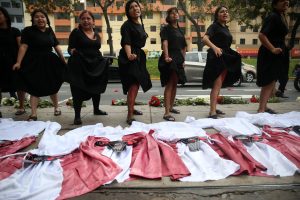
Lima, Jul 3 (EFE).- A group of women forcibly sterilized during the government of former President Alberto Fujimori protested Monday against the possibility of his being pardoned by current Peruvian President Pedro Pablo Kuczynski.
The president of the Association of Women Affected by Forced Sterilizations, Ruth Zuñiga Caceres, said they are protesting “so there will never be a pardon for the government that sterilized us between 1995 and 2000,” a reference to Fujimori’s second term in office.
The former president was sentenced to 25 years in prison for crimes against humanity, but Kuczynski said recently that he could consider a humanitarian pardon for Fujimori.
A group of sterilization victims, together with feminist and human rights organizations, gathered Monday at the headquarters of the Diplomatic Academy of Peru, where the 163rd period of sessions of the Inter-American Commission on Human Rights (IACHR) was being held in Lima.
The group’s intention was to seek an audience at the IACHR meeting in Uruguay next October to explain the plight of these victims.
Zuñiga told the press that the victims of forced sterilization included 300,000 women and 200,000 men nationwide, who 20 years later have not yet seen justice done nor have they received any compensation.
“We see no progress. We have evidence, but they have called us peasant women liars, though some of us had our tubes tied without anesthetics. I wasn’t anesthetized,” the association’s leader said.
Zuñiga asked for “justice and compensation for the female victims who were sterilized, and that the government acknowledge what happened and provide an emergency center to treat” the lingering effects of the surgery.
Court cases against the forced sterilization of peasant women were filed beginning with the second government of former President Alberto Fujimori in the year 2000, but the Peruvian Attorney General’s Office has still refused to open an investigation against the former president or against his then-health ministers for criminal solicitation in 77 of the cases.
The accusations included cases of women who died due to complications or a lack of follow-up care after the surgeries, as well as against the methods of pressure and misinformation that medical staff allegedly used to submit them to sterilization, in order to achieve the quota supposedly set by the government.
